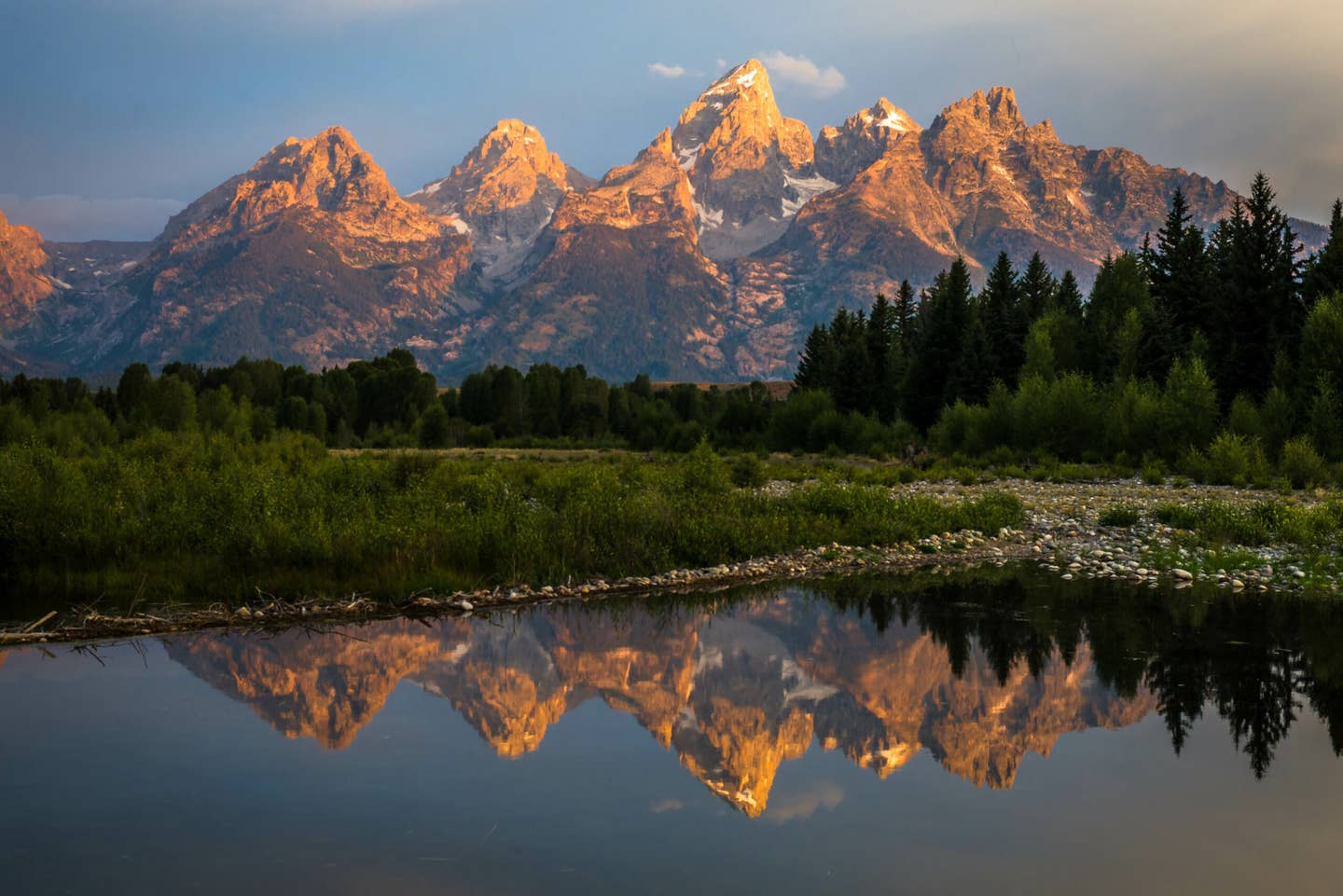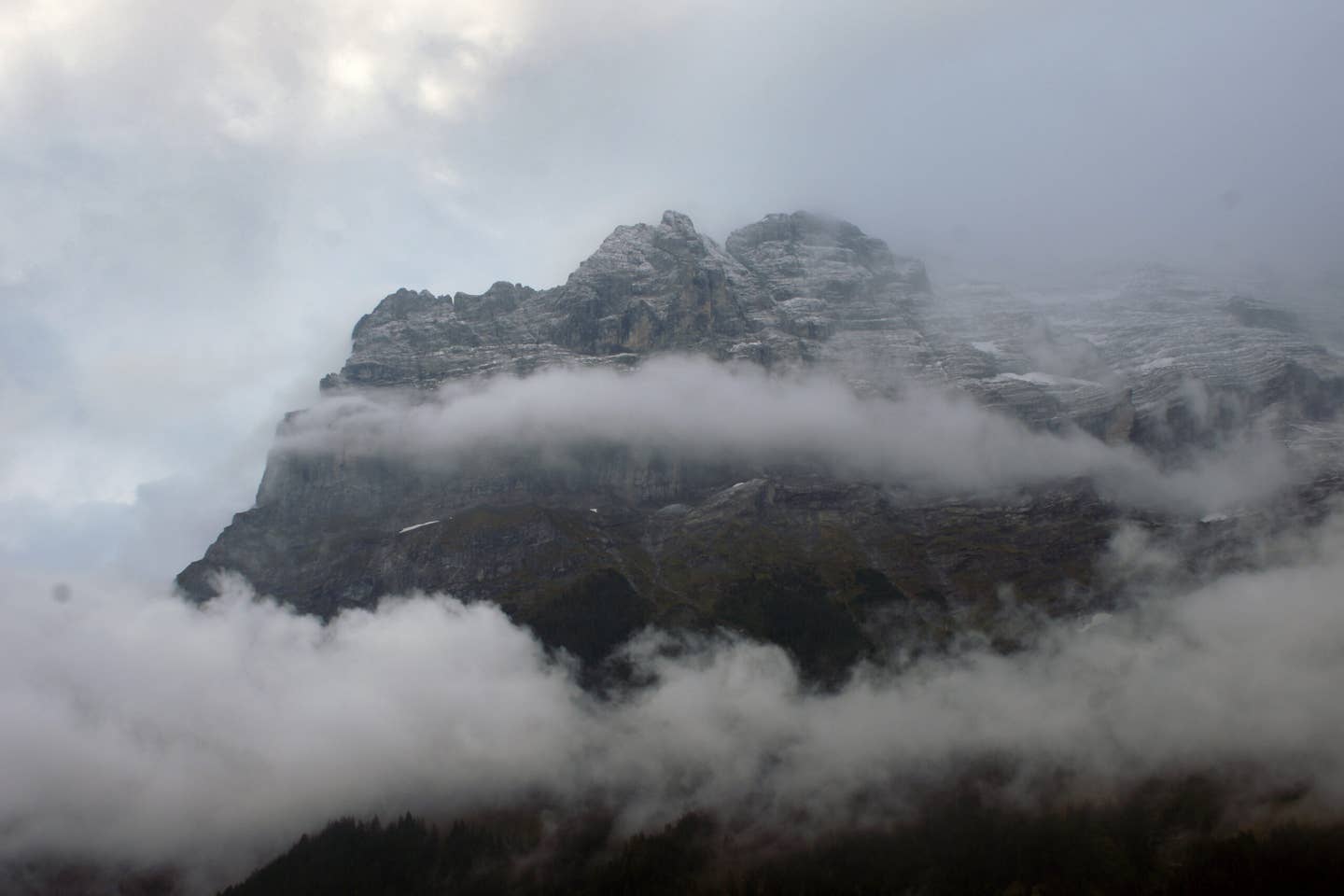Maureen Beck On What it Takes To Be the Strongest One-Armed Climber in the World
Popular Stories
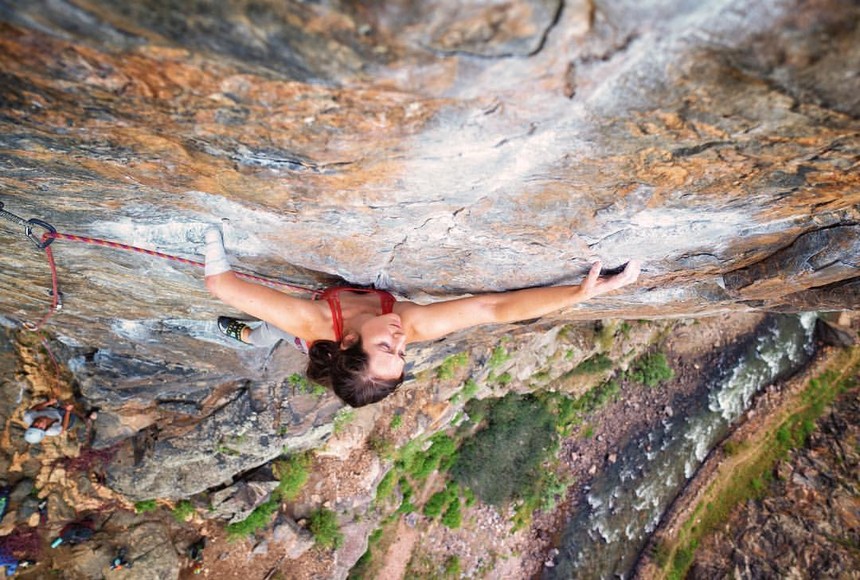 Maureen Beck on Reefer Madness, a classic 5.11a climb in Colorado's Boulder Canyon. Cedar Wright photo.
Maureen Beck on Reefer Madness, a classic 5.11a climb in Colorado's Boulder Canyon. Cedar Wright photo.
The first time I talked to Maureen Beck, she told me one her favorite stories about her life: Beck was maybe six years old, faced with the prospect of cutting the steak on her dinner plate. That seemingly innocuous task was complicated by one minor detail–Beck was born without her left hand.
Beck’s mother gave her a hard look over the dinner and asked incredulously what would happen when she was older: marry a guy, and just have him do it for her? Beck replied with something along the lines of: “I’ll just become a vegetarian.”
Now, at 31, Beck is not a vegetarian. Instead, she is one of the most dedicated rock climbers in the world, forging her own path through a world that by definition requires a whole body and mind to succeed. Or so she thought.
As Beck ventured deeper and deeper into climbing, she discovered that through a little creativity and a whole lot of grit and determination, it totally works with one arm. Secondly, she very quickly found out that she was not alone. These days, she is crushing hard routes, starring in a climbing film, giving back to the community in any way she can and serving as inspiration to anyone who thinks a physical shortcoming can prevent them from pursuing their dreams.
And that’s all with her left forearm wrapped tightly in tape around what she lovingly calls “my stump.”
Beginnings:
Growing up in the Maine woods, Beck credits her parents–whom she lovingly refers to as “ball-busters”–as the ones who taught her to persevere and forge her own way through life.
“I used to go to a summer Girl Scout camp at the foot of Mount Katahdin, fully immersed in nature," Beck says about her start in climbing. "The camp had actual granite rock climbing on the property, which was the perfect intro. My counselor would tell me ‘Mo, you don’t have to climb if you don’t want to,’ but of course that just motivated me way more. It was a little bit out of spite.”
Fast forward a decade, where as a student at the University of Vermont, Beck dove deep into climbing.
“I got really, really into it in college," says Beck. "Just like everyone else who finds out in college what they want to do for the rest of their lives.”
Unfortunately for Beck, there weren't many resources available to figure out climbing with one arm. Beck had to figure it out herself. And becoming a member of the university’s Outing Club helped her, quite literally, get off the ground.
“It was basically a way to find instant friends. There were so many like-minded individuals,” Beck recalls.
Since she had more or less taught herself how to climb, the club provided here with some concrete training, or at least enough to know how to not get herself killed. Throughout college, she kept her attitude of “if someone tells me I’m not able to do something, I’m going to go do it anyway.”
Beck found inspiration inspiration from role models like Lynn Hill (who famously was the first person to free climb Yosemite’s The Nose) as well as her friends who pushed her every day to do more than she thought was possible.
By her senior year, Beck took on a leadership role in the Outing Club, actively teaching her friends how to climb. Introducing new people to the sport became even more of a motivation, and soon led her to seek out other ways of doing that.
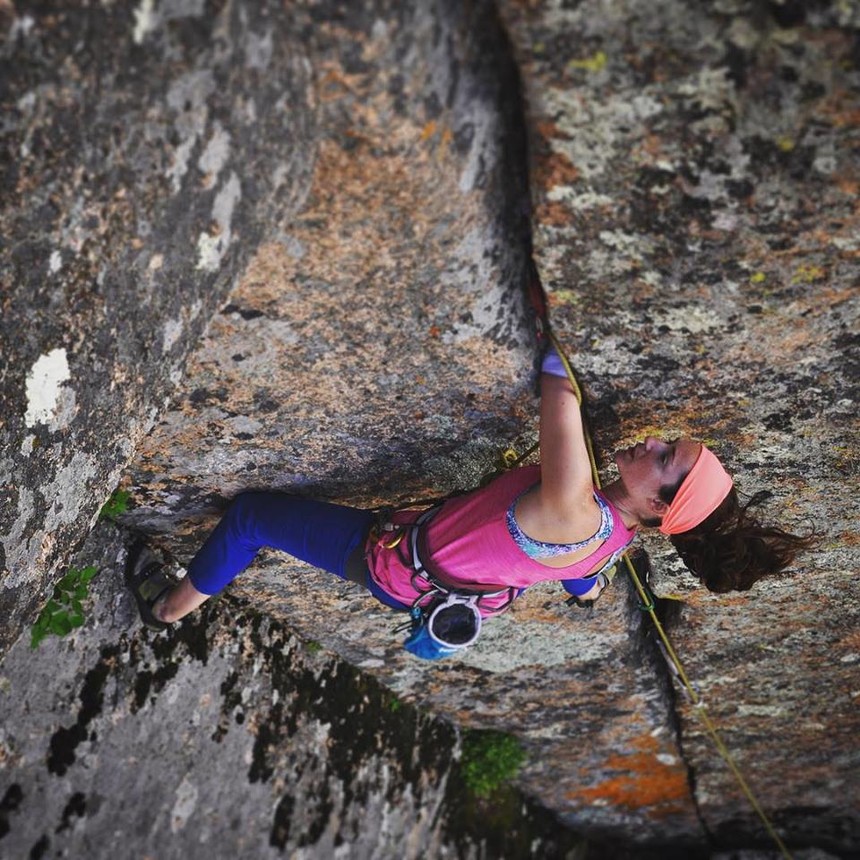 True the ethos of "I want to climb genuinely hard routes," Beck wrestles with the wall in Wyoming's Vedauwoo. Timpson Smith photo.
True the ethos of "I want to climb genuinely hard routes," Beck wrestles with the wall in Wyoming's Vedauwoo. Timpson Smith photo.
I’m Not The Only One
It was not until college that Beck realized she was far from the only person in the climbing world with a disability. Growing up before social media and every aspect of outdoor sports was shared online, she existed in a state of self-proclaimed blissful ignorance. Once she moved to Denver in 2012, she dove headfirst into the climbing scene. She credits the sheer number of climbers living in the greater Boulder/Denver area with showing her that she was not alone.
Paradox Sports, a small but growing outfit based out of Eldorado Springs, Colorado, made it their mission to make climbing accessible to all, and Beck was hooked immediately.
 Being one of the best paraclimbers in the world is hard work sometimes. Maureen Beck's Mom and Dad photo.
Being one of the best paraclimbers in the world is hard work sometimes. Maureen Beck's Mom and Dad photo.
Competition and Spreading the Word
Shortly after getting linked up to Paradox, Beck got involved in paraclimbing competitions, and her career began to take off.
“Paraclimbing competitions are still fairly new, and I was lucky to get in only the action early,” says Beck.
To give an idea of what these competitions are like, Beck explains that they are not far off from pro World Cup events in terms of stoke and even the level of climbing.
“Take the men’s leg amputee category, for example," Beck says. "Those dudes crush as hard as the rest of the pros."
Now, the paraclimbing world includes its own World Cup circuit, and a biannual World Championship, which Beck won in 2016 in Paris. The stoke keeps growing.
"Our own national competitions went from 30, to 60, and now this year 100 competitors,” says Beck.
The work of organizations like Paradox and other adaptive sports groups has been integral to this growth, acting as forum for those with a disability to meet one another and realize that climbing is not as exclusive as it may seem. Beck explains that paraclimbing is introduced to participants not as a one-time event, but rather as a lifelong activity.
“It’s not really supposed to be just a feel-good thing of ‘Oh we got some disabled folks to go climbing,’" says Beck. "Once they go once, people realize, 'Holy shit this is fun and I’m going to keep doing this.'”
Sign Up For Our Newsletter
As part of the instructor team for Paradox, Beck travels the country setting up climbing instruction sessions for adaptive climbers. This includes everything from getting gym staff familiar with all the specialized technical equipment to giving staff the overall comfort to work with people with disabilities.
“I basically teach two seminars focusing on showing what it’s like to live with a disability, and then literally show them the ropes necessary to get someone in a wheelchair climbing,” says Beck.
Each seminar ends with bringing a group of people with disabilities from the local community to experience climbing for the first time at the gym.
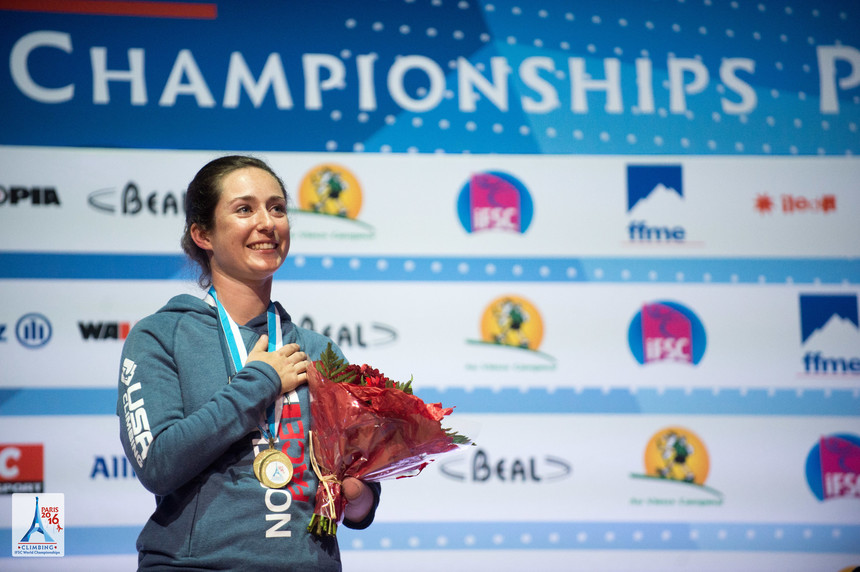 Becoming a paraclimbing world champion was a pivotal moment in Beck's career, and showed her that she was capable of so much more. Remi Fabregue photo.
Becoming a paraclimbing world champion was a pivotal moment in Beck's career, and showed her that she was capable of so much more. Remi Fabregue photo.
Days of Future Passed
After spending several years crushing it in competition climbing, Beck decided to turn her attention outside, to try to climb a route that she genuinely considered to be hard. Luckily, there is no shortage of hard climbing a few miles up the road from her house in Boulder, Colorado. The granite domes of Boulder Canyon hold a plethora of routes rated 5.12a or harder, so Beck had plenty to choose from.
“I got really sick and tired of people telling me that what I was doing was impressive for having one hand,” recalls Beck, “so I decided that I should go send something that would be impressive even for a two-handed climber.”
She ultimately settled on a route called Days of Future Passed, a classic 5.12a sport climb that included a highly technical crux move. For her, climbing at a hard grade was not about a show of strength. It was more like solving a puzzle by figuring out exactly what movements would allow her to stick to the wall.
Beck spent six months during a hot Boulder summer figuring out how to complete the climb. The south-facing climb sits in the sun most of the day, especially heinous as Boulder Canyon’s granite gets greasy and slippery when hot. After struggling for weeks to use friends’ beta to try to make the crux move, she finally figured out a new way to climb the route, using a heel hook to essentially replace using her left hand. The rest of the route was a breeze.
Her friends, local Boulder climbing legend Cedar Wright and Taylor Keating, joined to document her attempts. The problem with filming hard first ascents? The climber spends the day struggling up the wall, while the filmers spend all day pointing their camera in the same direction, waiting for the action to finally happen.
Keating and Wright were bored and looking for something to do when Keating tossed around the idea of filming his one-armed climbing friend. One thing led to another, and soon Beck had her own climbing documentary Stumped, which told the story of her battle with a rock wall. The film premiered last fall at the annual climbing film festival Reel Rock to a packed auditorium of stoked climbers.
“Cedar actually didn’t think I would be able to complete the route, so he started coming up with ideas for a B ending in the film,” says Beck. The pressure of the film deadline motivated Beck more than ever to finish the climb, and a few weeks later she sent it clean.
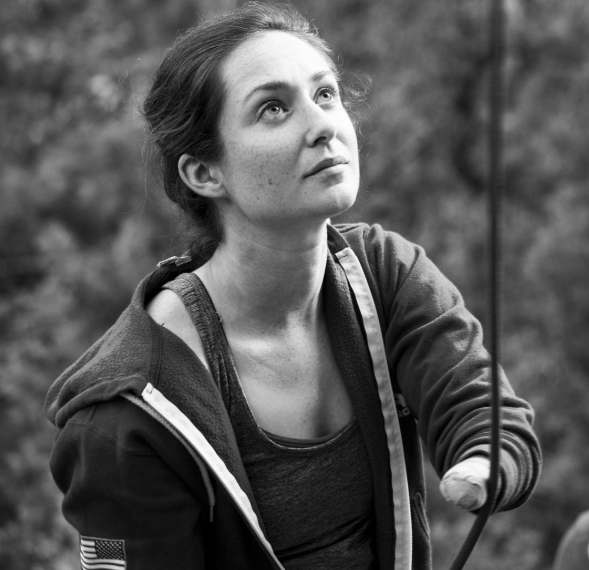 Beck's newest plan: get strong and put up the first adaptive ascent of a remote alpine climb in Northern Canada. Nick Mott photo.
Beck's newest plan: get strong and put up the first adaptive ascent of a remote alpine climb in Northern Canada. Nick Mott photo.
Alpine Ambitions and The Future
Sending a 5.12a was huge milestone in Beck’s life. When we spoke, she still had not bested her effort with a harder climb but had come up with a new goal: alpine climbing. Already planning a trip to the Cirque of the Unclimbables in northern Canada, she has set her eyes on claiming the first adaptive ascent of the Lotus Flower Tower, a 2,000-foot alpine big-wall climb.
“My buddy Jim and I–who lost a leg in a climbing accident a few years ago–will try to do a fully unsupported climb of the Tower,” says Beck.
For Beck, having an able-bodied mountaineer lead the climb would subtract from the point of the mission, and she fully accepts the challenge.
“Right now, I am a roadside sport cragger, so for the next few months I will be spending my weekends in Eldo and the Park climbing as many pitches as I can,” says Beck.
Beyond alpine climbing, Beck wants to keep working hard to make it easier for everyone to enjoy climbing. She helped write and publish a manual for adaptive climbing that is now accessible to climbing gyms and clubs all over the world.
“Until you learn that it isn’t, adaptive climbing seems like an impossible thing,” says Beck, thinking back to being 16 and taping a metal ladle to her stump in an attempt to make climbing easier, “If no one else has to go through that bullshit, then my job is done!”
